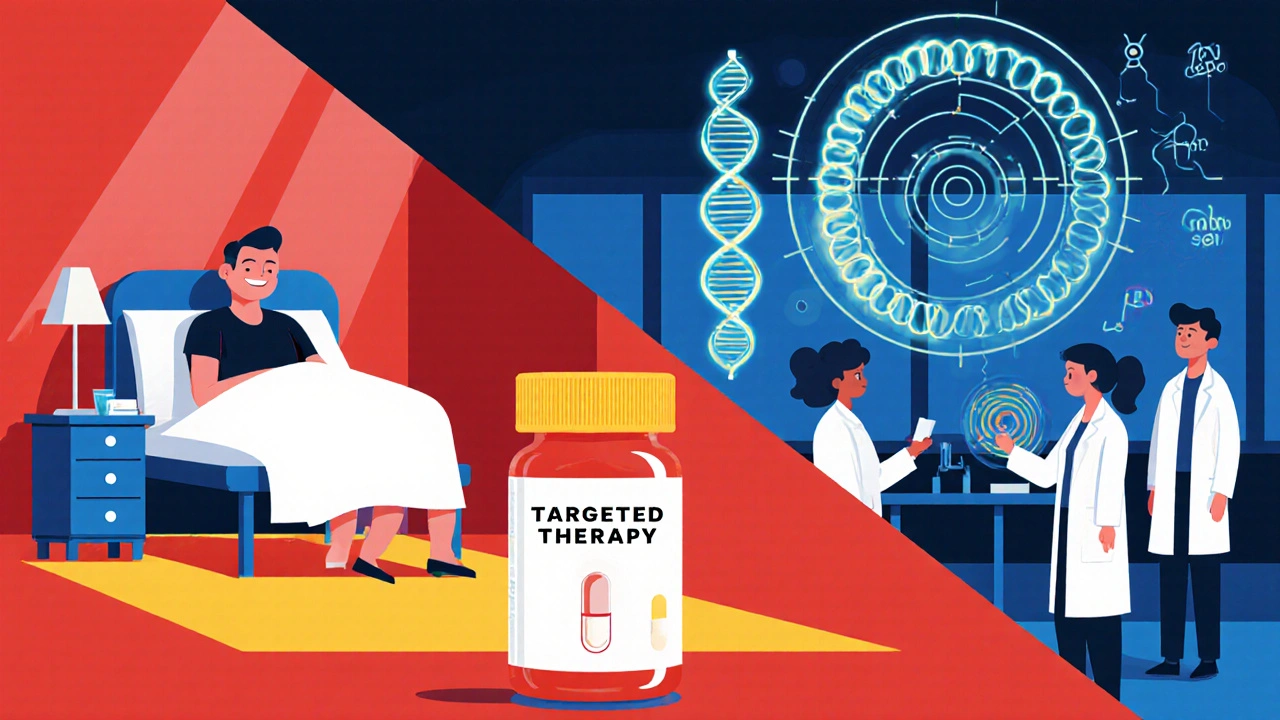Tyrosine Kinase Inhibitors: What They Are and Why They Matter
When working with Tyrosine Kinase Inhibitors, drugs that block enzymes called tyrosine kinases, which drive cell growth and signaling. Also known as TKIs, they are a cornerstone of targeted therapy, treatment that zeroes in on specific molecular drivers of disease and are widely used in oncology, the medical field focused on cancer diagnosis and care. By interrupting signal transduction pathways, the cascade of cellular events triggered when receptors are activated, TKIs can halt the uncontrolled proliferation that characterizes many tumors.
How TKIs Fit Into Modern Cancer Care
In everyday practice, physicians prescribe TKIs to treat diseases where a specific tyrosine kinase is overactive. Classic examples include imatinib for chronic myeloid leukemia, erlotinib for certain lung cancers, and sunitinib for renal cell carcinoma. Each drug targets a unique kinase, meaning the choice depends on the molecular profile of the tumor. This precision approach reduces exposure to broad‑spectrum chemotherapy, often leading to fewer side effects and better quality of life. The key is testing—genetic or immunohistochemical assays tell us which kinase is driving the cancer, guiding the right TKI selection.
Beyond cancer, TKIs have found roles in chronic inflammatory diseases and rare genetic disorders. For instance, ruxolitinib inhibits JAK kinases and is approved for myelofibrosis, while vemurafenib targets BRAF‑mutated melanoma. These extensions show that the principle—blocking a misbehaving kinase—applies wherever abnormal signaling fuels disease. As research uncovers new kinase mutations, the drug pipeline keeps expanding, promising more options for patients who previously had limited choices.
Safety is a practical concern. Common adverse effects include diarrhea, skin rash, and mild liver enzyme elevations. More serious risks—such as cardiovascular events or pulmonary toxicity—depend on the specific TKI and patient factors. Regular monitoring, dose adjustments, and patient education are essential to keep therapy both effective and tolerable. Many clinicians use baseline ECGs, liver panels, and periodic imaging to catch issues early.
Cost can be a barrier. TKIs are often high‑priced, but insurance plans, patient assistance programs, and generic versions (where available) help many patients afford treatment. Understanding the economics is part of the prescribing conversation, so patients know what to expect and can plan accordingly.
For healthcare professionals, staying current with guidelines is critical. Organizations like NCCN and ESMO release annual updates that incorporate the latest trial data, new drug approvals, and best‑practice dosing schedules. Following these resources ensures that the TKI chosen aligns with the most up‑to‑date evidence.
Patients also benefit from a clear action plan. Knowing when to take the medication, how to manage side effects, and when to report symptoms empowers them to stay on therapy longer. Support groups and online forums often share real‑world tips that complement formal medical advice.
Below you’ll find a curated collection of articles that dive deeper into specific TKIs, compare them with alternative treatments, and offer practical guidance for clinicians and patients alike. Whether you’re looking for dosing details, safety monitoring tricks, or the latest research breakthroughs, the posts ahead cover the breadth of information you need to make informed decisions about tyrosine kinase inhibitors.
How Targeted Therapy is Changing Leukemia Treatment
Explore how targeted therapy transforms leukemia treatment, from key drug classes and real-world success stories to practical patient checklists and future advances.
Read more
